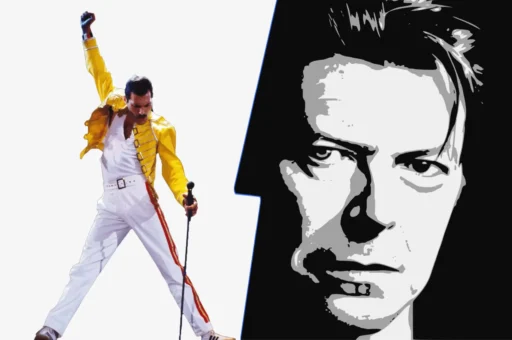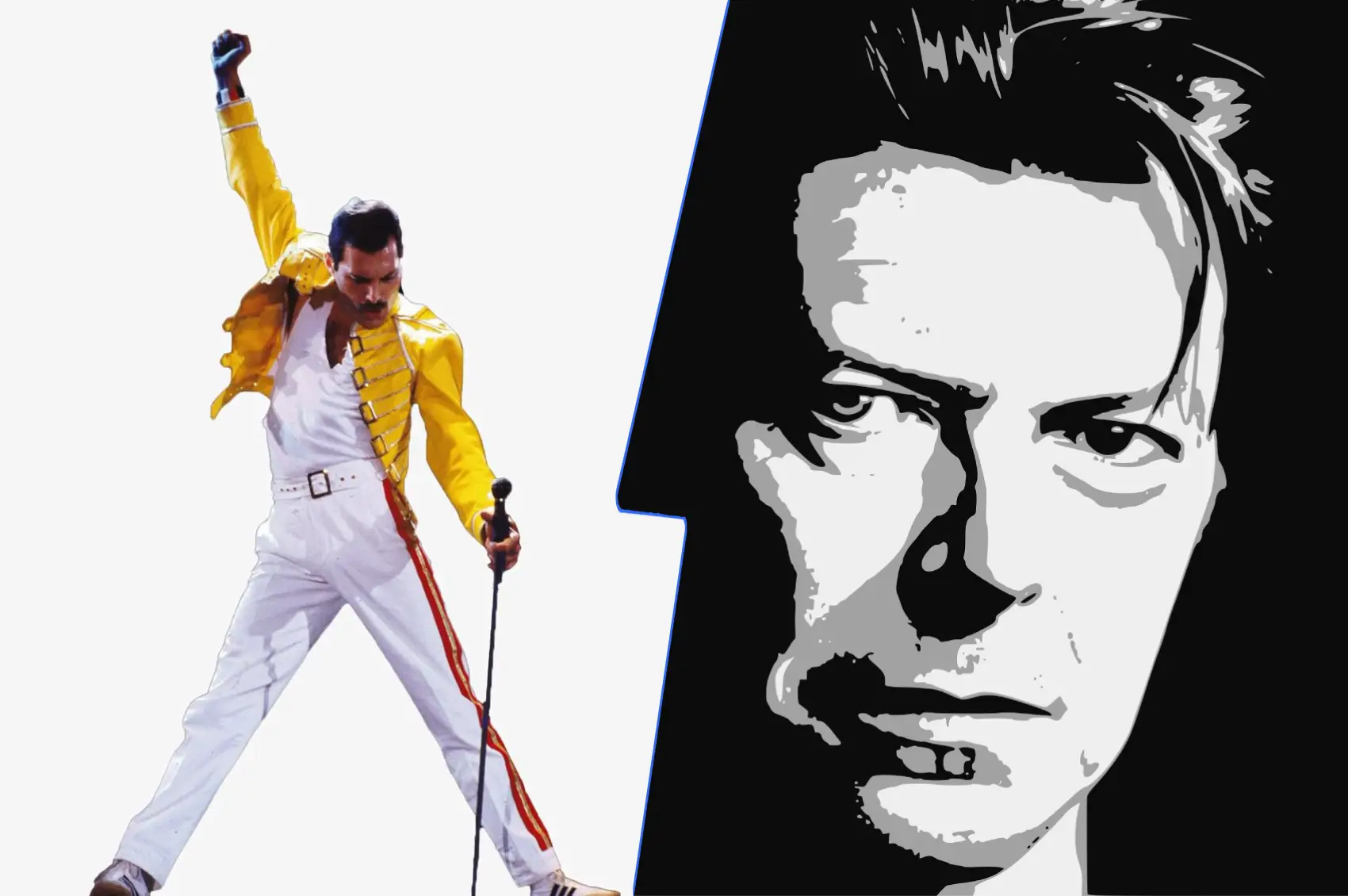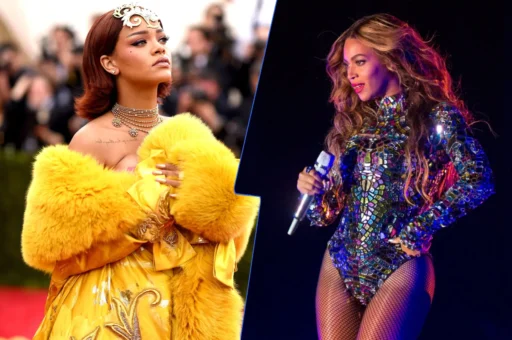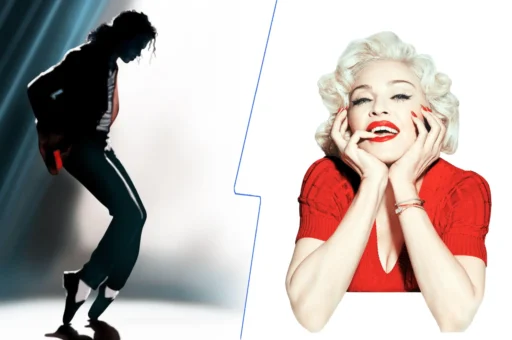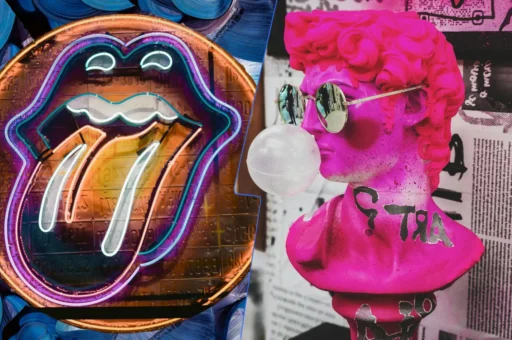When we speak of Freddie Mercury and David Bowie, we are talking about two of the most celebrated and transformative voices in rock history. Both men pushed boundaries, both in sound and performance, and both remain hugely influential decades after their peaks. But what did they do before they were famous? When did their careers begin? What inspired them, and what were their biggest breakthroughs? What are their most famous songs, biggest concerts, sales, cultural impacts—and ultimately, who changed music history more? Let’s explore.
Early Lives and Before Fame
Freddie Mercury
Born Farrokh Bulsara on 5 September 1946 in Zanzibar, Freddie was from a Parsi-Indian family. He spent part of his childhood in India, attending boarding school in Panchgani, Maharashtra, where he learned piano and showed early musical inclination. After political unrest in Zanzibar, his family moved to England in the 1960s. In London he studied graphic art and design at Ealing College of Art. Before joining Queen, he was involved with bands like “Wreckage” and “Ibex,” and did various jobs (even some odd jobs) while trying to break into the music scene. His move into Queen came in 1970 when he joined Brian May and Roger Taylor, and John Deacon later, forming the classic Queen line-up.
David Bowie
David Robert Jones was born on 8 January 1947 in Brixton, London. His family moved to Bromley and other parts of South London during his youth. He was interested in art, music and design from an early age. The influence of his older half-brother Terry Burns introduced him to modern jazz, Beat poetry, and the avant-garde during his youth. He learned saxophone (among other instruments) as a teenager. Later he adopted the stage name “David Bowie” in order not to be confused with Davy Jones (from The Monkees). Before achieving fame, he played in several bands, tried his hand at songwriting, and performed small gigs in London. His early material included folk, ballads, pop experiments, and then progressively more theatrical styles.
Career Beginnings, Inspirations, and Breakthroughs
Freddie Mercury
Freddie’s musical inspirations included operatic works, classical training (piano), and rock acts. The dramatic flair of his voice and stage persona was partially due to his cultural background and upbringing, combining showmanship with an art school sensibility. After Queen formed, their early albums in the early 1970s were experimental, progressive, with operatic and theatrical elements (multi-layered harmonies, complex arrangements). Queen’s second album Queen II (1974), Sheer Heart Attack (1974) started getting them recognition; but the big breakthrough was A Night at the Opera (1975) with “Bohemian Rhapsody”. That song changed expectations for what a rock single could be.
David Bowie
Bowie’s inspirations were more varied: early rock and roll, blues, jazz, avant-garde, art school, theatricality. He was interested in persona, image, change, exploring and combining genres. His early career had modest success; the song “Space Oddity” (1969) is often noted as his first major hit. It came around the time of the Moon landing, which he used thematically, giving him a strong public profile.His adoptation of alter egos (e.g. Ziggy Stardust in early 1970s) and use of visual / performative art, costumes, and narrative pushed him beyond just being a singer into more of a cultural provocateur.
Rise to Fame
Freddie Mercury / Queen
Queen started to gain strong recognition in the UK by mid-1970s. A Night at the Opera (1975) and especially “Bohemian Rhapsody” gave them international renown. Other songs like “Somebody to Love,” “We Are the Champions,” “We Will Rock You” further cemented their fame, especially in larger venues. Live shows with theatrical staging, Mercury’s powerful vocals and commanding presence on stage, contributed. Their performances at big events (for example Live Aid in 1985) also raised their profile immensely.
David Bowie
Bowie’s rise happened more gradually but also through shifting styles. After Space Oddity, albums like Hunky Dory and The Rise and Fall of Ziggy Stardust and the Spiders from Mars (1972) brought him stardom, especially in the UK. His appearance as Ziggy, and his performance on TV (e.g. Top of the Pops) gave him visibility. He also reinvented himself many times, so each major reincarnation (glam rock, soul/funk, electronic, pop) brought new audiences. The song “Fame” (1975), co-written with John Lennon, gave Bowie his first US #1, expanding his reach.
Styles, Cultural Influences, and Unique Traits
Freddie Mercury
-
Voice: extremely wide range, powerful, operatic abilities, dramatic chordal shifts, strong in harmonies; able to combine theatricality with rock.
-
Stage persona: flamboyant, commanding, showmanship, interacting with audience, using stage as theatre.
-
Songwriting: mixing opera, ballad, hard rock, disco, pop. Exploration of dynamics, structure (e.g. Bohemian Rhapsody’s unusual multi-section structure).
-
Visuals: costumes, dramatic lighting, complex arrangements. Mercury’s background in art and his taste for performance played big role.
-
Cultural influence: representation of sexuality, flamboyance, breaking norms; influence on later artists in both rock and pop, in LGBTQ+ communities, in live performance tradition.
David Bowie
-
Reinvention: change of persona (Ziggy Stardust, Aladdin Sane, The Thin White Duke, etc.), changing musical styles constantly (glam rock, soul, electronic, ambient, pop, art rock).
-
Theatrical / visual art: Bowie’s stagecraft, theatricality, merging of music with fashion, performance art, visual aesthetics; interest in science fiction, space, dystopia, identity, and cultural commentary.
-
Songwriting: poetic lyrics, experimentation, pushing rock outward, borrowing electronic, avant-garde, soul, funk, industrial sounds.
-
Influence: with ideas of identity, gender fluidity, fashion, art, multimedia. He influenced not just music, but style, visuals, subculture, industrial, electronic music, and pop.
Top Songs
Here are five of the most famous / enduring songs for each:
Freddie Mercury / Queen
-
“Bohemian Rhapsody” – arguably his signature song; very influential.
-
“We Are the Champions”
-
“Somebody to Love”
-
“Don’t Stop Me Now”
-
“Crazy Little Thing Called Love” or “We Will Rock You” (or “Another One Bites The Dust”) depending on region.
David Bowie
-
“Space Oddity”
-
“Starman”
-
“Changes”
-
“Heroes”
-
“Let’s Dance” or “Life On Mars?” depending on the metric and era.
Notable Statistics & Achievements
Here are various numbers, data and statistics for both artists: record sales, big concerts, YouTube / streaming / live plays, etc., what is publicly known.
Freddie Mercury / Queen
-
Estimated Record Sales: Between 250 and 300 million records worldwide.
-
Biggest Concert Attendance: Knebworth Park (1986), around 140,000 officially, possibly up to 200,000.
-
Free Concerts: Hyde Park in 1976 drew an estimated 150,000 fans.
-
Historic Performance: Live Aid (1985) at Wembley, ~72,000 present but broadcast to billions.
-
Streaming Success: “Bohemian Rhapsody” became the first pre-1990 song to reach 1 billion views on YouTube.
-
Awards & Legacy: Greatest Hits is still the UK’s best-selling album of all time.
David Bowie
-
Estimated Record Sales: Around 100 million records globally.
-
Biggest Tour: Sound+Vision Tour (1990) — 108 shows in 27 countries, five continents.
-
Large Scale Tours: Serious Moonlight (1983) and Glass Spider (1987) attracted hundreds of thousands across continents.
-
Streaming Success: Top Spotify songs include “Space Oddity,” “Heroes,” “Life on Mars?,” and “Let’s Dance.”
-
Awards & Legacy: Inducted into the Rock & Roll Hall of Fame (1996). Considered a pioneer of glam rock, art rock, and avant-garde pop.
What Makes Each Unique & Why Their Appeal Is Global
Freddie Mercury
-
A truly dynamic live performer: his command of stage, charisma, vocal power; being able to fill stadiums, engage large crowds; the Live Aid performance is often cited as one of the greatest live rock moments ever.
-
His songwriting often combined genres in unexpected ways; willingness to defy conventions (operatic sections in “Bohemian Rhapsody,” disco or funk influences, theatrical intros).
-
A symbol of flamboyance, of breaking taboos: about sexuality, showmanship; a performer whose identity and presence mattered as much as his music.
-
His voice: unique tone, wide range, personality. Many artists cite Queen / Mercury as influences thanks to vocal techniques, layering, arrangement.
David Bowie
-
Reinvention and adaptability: Bowie never stayed in one style; always exploring new sounds, imagery, visual art, fashion. That made him influential across decades and genres.
-
Concept, persona, narrative are central. Bowie’s work is not just songs, but world-building: characters, alter egos, personas, futuristic or extraterrestrial themes, identity. That gives depth beyond just catchy songs.
-
Influence beyond music: in fashion, gender, visual arts, film; Bowie’s boundary-pushing inspired not just musicians but artists in other fields.
-
Longevity and consistency: from late 1960s until his death, Bowie was releasing ambitious work, often ahead of or parallel to trends, sometimes reinventing what pop/rock could be.
Comparison & Who Changed Music History More?
When asking who changed music history more (Freddie Mercury or David Bowie), the answer isn’t straightforward, because “changed music history” can be measured in different ways: commercial success, influence on other artists, innovation, cultural impact, etc.
Here are some comparative observations:
Freddie Mercury’s Strengths
-
Innovation in song structure (Bohemian Rhapsody changed rock singles forever).
-
One of the greatest live performers in rock history; unmatched charisma.
-
Created global anthems (“We Will Rock You,” “We Are the Champions”) that unite stadiums.
-
A voice of immense power and range, celebrated across genres.
-
Cultural icon in LGBTQ+ visibility, breaking taboos about identity and performance.
David Bowie’s Strengths
-
Master of reinvention: Ziggy Stardust, Thin White Duke, countless personas.
-
Merged fashion, theatre, art, and rock into a complete cultural package.
-
Innovated musically across glam rock, soul, funk, electronic, industrial, and pop.
-
Broader cultural impact beyond music — fashion, cinema, art, gender expression.
-
Career longevity with consistent reinvention from the 1960s to 2016.
Side-by-Side Takeaway (Mobile Friendly)
-
Performance & Voice: Mercury edges ahead as the showman.
-
Cultural Breadth: Bowie pushed into art, style, and identity, giving him wider reach.
-
Commercial Success: Queen outsold Bowie significantly.
-
Adaptability: Bowie stayed relevant across decades through reinvention.
-
Historic Moments: Mercury’s Live Aid remains iconic; Bowie’s Ziggy Stardust redefined what a rock persona could be.
I’d argue that both changed music history significantly, but in somewhat different domains: Freddie Mercury changed the way rock performance, vocal expression, and stadium-anthem style could work; Bowie changed the way rock/pop could intersect with persona, visual, identity, themes, allowing more art, more transformation.
If forced to choose who perhaps changed more in terms of influence on music history overall, I lean toward David Bowie because of the breadth and depth of transformation: his influence stretches into art, fashion, identity, genre-hybridization, not just powerful singing or rock spectacle. But that does not diminish Freddie Mercury’s enormous, arguably more immediately felt impact in terms of performance and vocal artistry and in generating anthems that unite people in stadiums.
Conclusion
Freddie Mercury and David Bowie both reshaped rock music and popular culture. Mercury’s strengths lie in vocal range, dramatic originals, unforgettable live performances and anthems. Bowie’s strengths lie in constant reinvention, thematic depth, persona creation, and influencing not just music but culture and identity. If one has to say who changed music history more, I would give Bowie a slight edge for his multifaceted influence; but Mercury’s legacy is equally indelible in the realm of performance, musicality, and emotional connection.
Engage with Us!
Which singer do you think changed music history more: Freddie Mercury or David Bowie? Maybe you have a favorite song, a special concert memory, or feel one is more personally meaningful. Share your thoughts in the comments and feel free to post this on social media to see what others think.
Inbound Link Suggestions
- Rock Music vs. Pop Music: A Comprehensive Comparison
- Jimi Hendrix vs. Eric Clapton: Comparing Guitar Gods
- Elvis Presley vs. Johnny Cash: Legends of Music
Outbound Link Suggestions
- Britannica — for verified biographies of Freddie Mercury and David Bowie
- setlist.fm — for detailed concert-statistics, setlists, and live performance histories
- RollingStone — for critiques, retrospectives, and influence pieces on both artists
